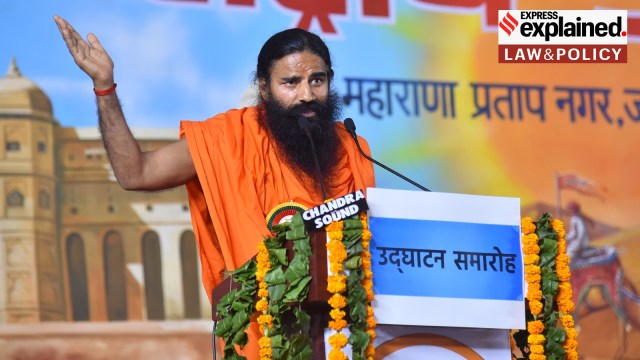Why did the Supreme Court ban Baba Ramdev’s Patanjali from advertising its products?
The apex court lambasted Patanjali for publishing misleading advertisements and banned it from marketing its products until further orders are passed.
 Baba Ramdev's Patanjali was taken to task by the Supreme Court for continuing to publish false and misleading adverts, despite being told not to. (Express Photo by Rohit Jain Paras/File)
Baba Ramdev's Patanjali was taken to task by the Supreme Court for continuing to publish false and misleading adverts, despite being told not to. (Express Photo by Rohit Jain Paras/File)The Supreme Court Tuesday (February 27) came down heavily on Baba Ramdev’s Patanjali Ayurved for publishing misleading advertisements, and banned it from marketing its products until further orders are passed.
A bench comprising Justices Hima Kohli and Ahsannudin Amanullah took Patanjali to task for publishing advertisements that directly attacked allopathic medicines despite giving an assurance to the court in November 2023 that “no casual statements claiming medicinal efficacy or against any system of medicine will be released to the media in any form.”
What are the allegations against Patanjali?
The Indian Medical Association (IMA) filed a petition at the apex court in August 2022 after Patanjali published an advertisement titled “MISCONCEPTIONS SPREAD BY ALLOPATHY: SAVE YOURSELF AND THE COUNTRY FROM THE MISCONCEPTIONS SPREAD BY PHARMA AND MEDICAL INDUSTRY.”
The petition details other instances where Ramdev called allopathy a “stupid and bankrupt science”, and made claims about allopathic medicine being responsible for Covid-19 deaths. The IMA also accused Patanjali of contributing to vaccine hesitancy during the pandemic by spreading false rumours.
The IMA claims that these attacks against modern medicine through a “continuous, systematic, and unabated spread of misinformation” come alongside Patanjali’s own efforts to make false and unfounded claims about curing certain diseases through the use of Patanjali products.
What is the legal argument against Patanjali’s actions?
The IMA claimed that the advertisement was in direct violation of the Drugs & Other Magical Remedies Act, 1954 (DOMA), and the Consumer Protection Act, 2019 (CPA). The publishing of false and misleading advertisements is an offence under both statutes.
Under Section 4 of the DOMA, there is a prohibition against publishing misleading advertisements relating to a drug. This is described as an advertisement which “directly or indirectly gives a false impression regarding the true character of the drug”, “makes a false claim for the drug”, or “is otherwise false or misleading in any material particular.”
Publishing a misleading advertisement under the DOMA is punishable with up to six months imprisonment, and/or a fine for the first offence. On the second offence, the period of imprisonment can extend to one year.
The IMA has also highlighted the Memorandum of Understanding signed by the Ministry of AYUSH and the Advertising Standards Council of India in January 2017. AYUSH, which is responsible for developing and setting medical standards for traditional medicine, agreed to identify misleading advertisements that may be in violation of the DOMA, and send complaints to the Council for review. Despite this, the IMA claims that Patanjali has continued to disregard the law and violate the DOMA.
Section 89 of the CPA contains even more stringent punishments for false or misleading advertisements. It states: “Any manufacturer or service provider who causes a false or misleading advertisement to be made which is prejudicial to the interest of consumers shall be punished with imprisonment for a term which may extend to two years and with fine which may extend to ten lakh rupees; and for every subsequent offence, be punished with imprisonment for a term which may extend to five years and with fine which may extend to fifty lakh rupees.”
The CPA also provides the definition for a “misleading advertisement”. It includes advertisements which give a false description of the product or service, partakes in unfair trade practices, deliberately conceals important information, or is likely to mislead the consumer about the nature, substance, quantity or quality of the product or service.
How has the SC approached the case so far?
The Supreme Court has warned Patanjali regarding their false and misleading advertising on multiple occasions now, with February 27 marking an escalation in the court’s approach.
The case was first heard substantively on November 21 last year. Justice Amanullah orally warned Patanjali against claiming that their products can completely “cure” diseases, and threatened to impose a cost of Rs 1 crore on every product for which such a claim is made. The court’s focus has decidedly been on the subject of curbing misleading advertisements as they have clearly stated that they do not wish to enter the “Allopathy v. Ayurveda” debate.
Senior Advocate Sajan Poovayya, representing Patanjali, assured the court that there “shall not be any violation of any law(s), especially relating to advertising or branding of products manufactured and marketed by it and, further, that no casual statements claiming medicinal efficacy or against any system of medicine will be released to the media in any form”, as per the order passed on November 21. Additional Solicitor General K M Nataraj, representing the central government, also agreed to look into the allegations and suggest measures in response.
On January 15, the court received an anonymous letter addressed to the Chief Justice of India and Justice Amanullah regarding the continued publishing of false and misleading advertisements. In the next hearing on February 27, the court noted that Patanjali continued to publish advertisements with claims that they could provide “permanent relief” for diseases and that their products were superior to conventional medicines.
After asking the government for details of their consultation with other ministries so far, an irate Justice Amanullah stated: “The entire country has been taken for a ride! For two years you wait when the Drugs Act says this is prohibited?”
Deeming Patanjali’s actions “unacceptable” the court overrode the requests to allow ads without “adjectives”, and placed a blanket ban until further orders on any further advertising or branding of Patanjali medicinal products, and warned the company once again against making adverse statements regarding conventional medicine on any media forum.
The case will be heard again on March 19.





- 01
- 02
- 03
- 04
- 05

































